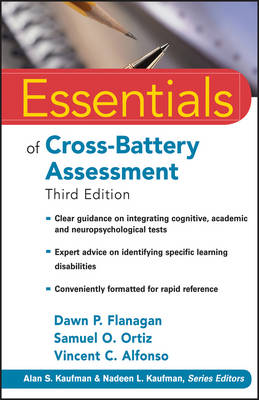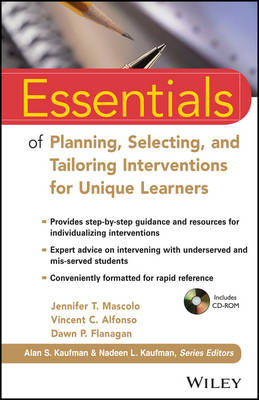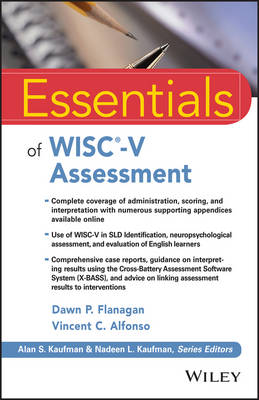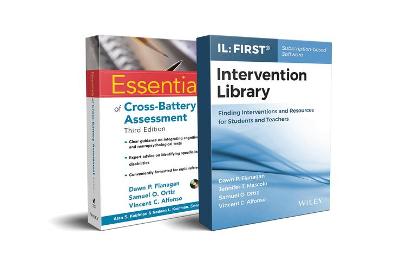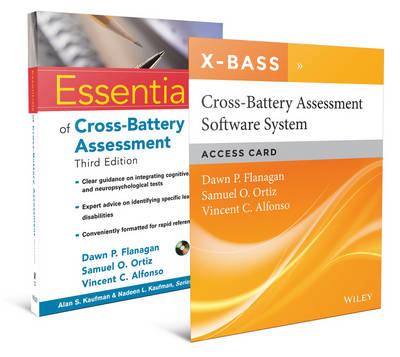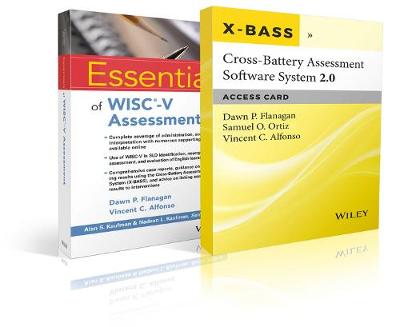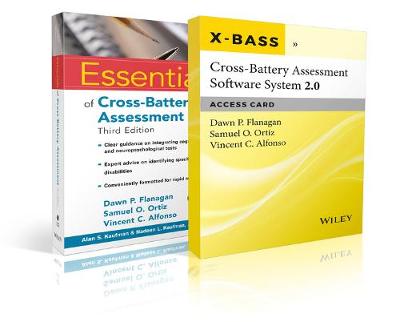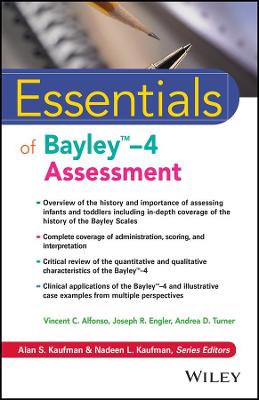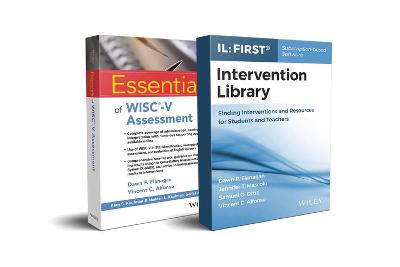Essentials of Psychological Assessment
2 primary works • 12 total works
Book 81
Essentials of Wisc-IV Assessment 2nd Edition with Cognitive Abilities Assessment Set
by Dawn P. Flanagan
Note: CD-ROM/DVD and other supplementary materials are not included as part of eBook file.
Book 84
Essentials of Cross-Battery Assessment
by Samuel O. Ortiz, Dawn P. Flanagan, and Vincent C. Alfonso
Each concise chapter features numerous callout boxes highlighting key concepts, bulleted points, and extensive illustrative material, as well as "Test Yourself" questions that help you to gauge and reinforce your grasp of the information covered. Essentials of Cross-Battery Assessment, Second Edition is updated to include the latest edition of cognitive ability tests, including KABC-II, SB5, WISC-IV, WPPSI-III, DAS-II, WAIS-III, and WJ III COG as well as the most current comprehensive achievement tests, such as WJ III ACH, KTEA-II, and WIAT-II. A new chapter demonstrates the use of the XBA approach in assessing learning disabilities in a manner consistent with the recent reauthorization of IDEA. This book now includes a CD-ROM that contains three programs that allow you to enter data and review results: the Cross-Battery Assessment Data Management and Interpretive Assistant (XBA DMIA) v1.0; the Specific Learning Disability (SLD) Assistant v1.0; and the Culture-Language Interpretive Matrix (C-LIM) v1.0. Note: CD-ROM/DVD and other supplementary materials are not included as part of eBook file.
Essentials of Planning, Selecting, and Tailoring Interventions for Unique Learners
by Jennifer T. Mascolo, Vincent C. Alfonso, and Dawn P. Flanagan
As with all volumes in the Essentials of Psychological Assessment series, this volume includes callout boxes highlighting key concepts, extensive illustrative material, and test questions. The companion CD-ROM provides additional worksheets, case studies, and handouts.
Essentials of WISC-V Assessment
by Dawn P. Flanagan and Vincent C. Alfonso
This book gives you an in-depth understanding of the WISC-V assessment and interpretive process to assist practitioners in: * Conducting efficient and informative WISC-V assessments * Utilizing WISC-V in cross-battery and neuropsychological assessment * Applying WISC-V in the identification of specific learning disabilities * Utilizing WISC-V in nondiscriminatory assessment of English language learners * Writing theory-based WISC-V reports * Linking WISC-V findings to interventions based on individual performance As the world's most widely-used intelligence test for children, the WISC-V is useful in diagnosing intellectual disabilities and specific learning disabilities, as well as in identifying giftedness. In this volume, sample reports demonstrate how WISC-V assessment results may be linked to interventions, accommodations, modifications, and compensatory strategies that facilitate positive outcomes for children. Essentials of WISC-V Assessment is the all-in-one practical resource for both students and practitioners.
The book can be used on its own or with companion software (purchased separately) that provides a user-friendly tool for producing psychometrically and theoretically defensible interpretations of WISC-V performance, and may be used to develop interventions based on each child's strengths and weaknesses.
Essentials of Specific Learning Disability Identification
by Dawn P. Flanagan and Vincent C. Alfonso
A Resource for Designing and Implementing Intervention Programs for At-Risk Learners This set includes Essentials of Planning, Selecting, and Tailoring Interventions for Unique Learners, along with access to the Intervention Library (FIRST). This authoritative resource provides step-by-step procedures for planning, selecting, and tailoring interventions for at-risk learners with a unique focus on how to individualize interventions using actual case examples. Each chapter describes how specific difficulties interfere with classroom tasks and explain how to select, modify, or otherwise tailor an intervention based on that information. As with all volumes in the Essentials of Psychological Assessment series, this volume includes callout boxes highlighting key concepts, extensive illustrative material, and test questions.
Essentials of Cross–Battery Assessment, 3e Set with Letter and XBass Registration Card
by Dawn P. Flanagan, Samuel O. Ortiz, and Vincent C. Alfonso
*This set includes The Essentials of WISC-V Assessment packaged with an access card to download version 2.0 of the Cross-Battery Assessment Software System (XBASS). The Essentials of WISC-V Assessment pairs perfectly with the companion software in this set for a user-friendly tool for producing psychometrically and theoretically defensible interpretations of WISC-V performance, and may be used to develop interventions based on each child's strengths and weaknesses.
Essentials of WISC-V Assessment provides step-by-step guidance for administering, scoring, and interpreting the Wechsler Intelligence Scale for Children (WISC-V). Packed with practical tips for more accurate assessment, this informative guide includes numerous case studies that illustrate a range of real-world issues. Special attention is devoted to the assessment of individuals who have significant learning difficulties, such as learning disabilities, and who speak English as a second language. The WISC-V is a valuable assessment tool, but it must be administered and scored appropriately to gain meaning from score interpretation.
The Cross-Battery Assessment Software System (X-BASS) 2.0 allows school psychologists and other assessment professionals access to efficient, expert analysis of cross-battery assessment findings. It integrates the Cross-Battery Assessment Data Management and Interpretive Assistant, Pattern of Strengths and Weaknesses Analyzer, and Culture-Language Interpretive Matrix into a single program, covering the latest revisions of major batteries, including the new WISC®-V, WJ IV®, KTEA(tm)-3, ChAMP, UNIT-2, RIAS-2, FAR, FAM, WISC®-V Integrated, WJV-IV ECAD, CELF®-5, CTOPP-2, CAS2, and over 125 psychological batteries and 1,000 subtests, all classified according to CHC theory. Preprogrammed formulas conduct the analyses and display the results within the context of CHC theory, and allow you to customize the parameters to answer specific questions. Compatible with Windows and Mac OS X, the internal database, single-instance data entry, automatic and integrated summary graphing, guided PSW analysis, and much more make X-BASS an essential one-stop within-battery and Cross-Battery Assessment solution.
Essentials of Bayley-4 Assessment
by Joseph R. Engler, Andrea D. Turner, and Vincent C. Alfonso
In Essentials of Bayley 4 Assessment, a distinguished team of authors delivers state-of-the-art guidelines for the application of the new Bayley 4 test of infant and toddler development. The resource offers a comprehensive guide to administering, scoring, interpreting, and applying the test.
The resource provides key updates made since the publication of the previous version of the test, such as:
- Updated administration and scoring guideance, content updates, new norms and clinical studies, and shortened administration time
- Instruction on a Digital Delivery Option of the Bayley 4 (i.e., Q-interactive)
- New illustrative case studies and examples of Bayley 4 reports.

